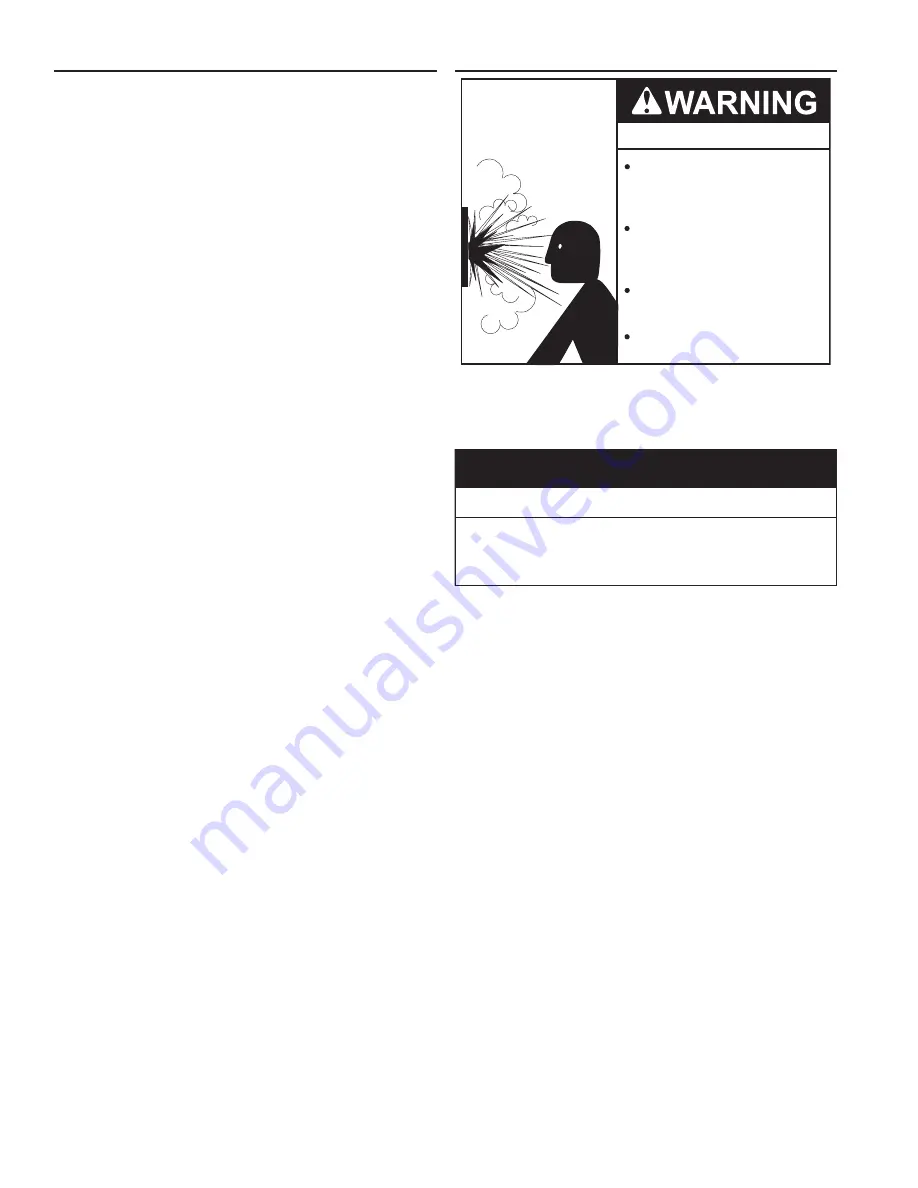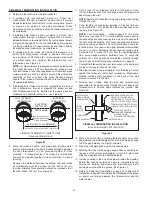
40
t&p ValVe discharge pipe
Explosion Hazard
Temperature-Pressure Relief Valve
must comply with ANSI Z21.22-
CSA 4.4 and ASME code.
Properly sized temperature-
pressure relief valve must be
installed in opening provided.
Can result in overheating and
excessive tank pressure.
Can cause serious injury or death.
This water heater is provided with a properly rated/sized and
certified combination temperature - pressure (T&P) relief valve
by the manufacturer. See Temperature-Pressure relief Valve on
page 15 for information on replacement and other requirements.
Water Damage Hazard
Temperature-Pressure Relief Valve discharge
pipe must terminate at adequate drain.
•
CAUTION
install a discharge pipe between the T&P valve discharge opening
and a suitable floor drain. Do not connect discharge piping
directly to the drain unless a 6” (15.2 cm) air gap is provided.
To prevent bodily injury, hazard to life, or property damage, the
relief valve must be allowed to discharge water in adequate
quantities should circumstances demand. if the discharge pipe is
not connected to a drain or other suitable means, the water flow
may cause property damage.
t&p Valve discharge pipe requirements:
•
Shall not be smaller in size than the outlet pipe size of the
valve, or have any reducing couplings or other restrictions.
• Shall not be plugged or blocked.
• Shall not be exposed to freezing temperatures.
• Shall be of material listed for hot water distribution.
• Shall be installed so as to allow complete drainage of both
the Temperature-Pressure relief Valve and the discharge
pipe.
• must terminate a maximum of six inches above a floor
drain or external to the building. in cold climates, it is
recommended that the discharge pipe be terminated at an
adequate drain inside the building.
• Shall not have any valve or other obstruction between the
relief valve and the drain.
water line connections
The water piping installation must conform to these instructions
and to all local and national code authority having jurisdiction.
Good practice requires that all heavy piping be supported.
read and observe all requirements in the following sections
before installation of the water piping begins:
1. mixing Valves on page 14.
2.
Dishwashing machines on page 14.
3. Temperature-Pressure Relief Valve on page 15.
4.
Closed Systems and Thermal Expansion on page 14.
5.
For multiple water heater installations see Water Piping
Diagrams beginning on page 67.
water piping diagrams
This manual provides detailed water piping diagrams for typical
methods of application for the water heaters, see Water Piping
The water heater may be installed by itself, or with a separate
storage tank. When used with a separate storage tank, the
circulation may be either by gravity or by means of circulating
pump. When a circulating pump is used, it is important to note
that the flow rate should be slow so that there will be a minimum
of turbulence inside the water heater storage tank.
Adjust flow by throttling a full port ball valve installed in the
circulating line on the outlet side of the pump. Never throttle flow
on the suction side of a pump. See the Water Piping Diagrams
note:
in addition to the factory installed Temperature-Pressure
relief Valve (T&P valve) on the water heater, each remote
storage tank that may be installed and piped to a water heating
appliance must also have its own properly sized, rated and
approved Temperature-Pressure relief Valve installed.
Call the toll free technical support phone number listed on the
back cover of this manual for further assistance in sizing a T&P
valve for remote storage tanks.
thermometers (not supplied)
Thermometers are installed in the water piping system as a
means of detecting the temperature of the hot water supply at
critical points in the system. Field supplied thermometers should
be obtained and installed. See Water Piping Diagrams on page 67.
water (potaBle) heating and space heating
1.
All water piping components connected to the water heater
that are for space heating applications shall be suitable for
use with potable water.
2.
Toxic chemicals, such as those used for boiler treatment,
must NEVEr be introduced into this system.
3.
The water heaters covered in this manual may never be
connected to any existing heating system or component(s)
previously used with non-potable water heating appliance.
4.
When the system requires water for space heating that
exceed safe temperatures at domestic water fixtures a
mixing valve must be installed, see mixing Valves on page 14.
Summary of Contents for 101 Series
Page 75: ...75...
















































